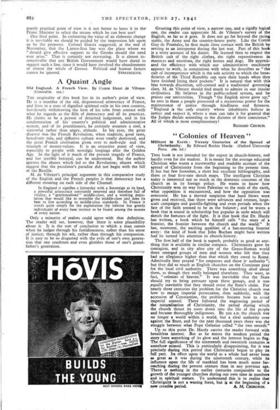" Colonies of Heaven "
This book is not intended for the expert in church-history, and hardly even for the student. It is meant for the average educated Christian who wants a trustworthy and readable account of the spread of Christianity from the beginning to the present time. It has but few footnotes, a short but excellent bibliography, and three or four first-rate sketch maps. The intelligent Christian today is interested not so much in the domestic concerns of the church as in its foreign policy. He wants to know how Christianity won its way from Palestine to the ends of the earth, what opposition it encountered, and how the opposition -was overcome. He has a shrewd suspicion that hard blows were given and received, that there were advances and retreats, large- scale campaigns and guerilla-fighting and even periods when the fate of the faith seemed to be in the balance ; and he wants a book that is sound in scholarship but popular in style which will sketch the fortunes of the fight. It is that book that Dr. Hardy has written, a book which he himself calls " the story of a frontier, the frontier between the church and the world." It has, moreover, the exciting qualities of a fast-moving frontier- story : the kind of book that John Buchan might have written had he turned his attention to church-history.
The first half of the book is superb, probably as good as any- thing that is available in similar compass. Christianity grew by contagion, and in city after city of the Greco-Roman world there emerged groups of men and women who felt that they had an allegiance higher than that which they owed to Rome. Admittedly they prayed " for emperors and those it authority "; but they did so much as English churches on the Continent pray for the local civil authority. There was something aloof about them, as though they really belonged elsewhere. They were, in fact, " colonies of heaven." It was inevitable that the State should try to bring pressure upon these groups, and it was equally inevitable that they should resist the State's claim. For nearly three centuries the problem for the Christian church was how to escape imperial persecution, then suddenly, with the accession of Constantine, the problem became how to avoid imperial control. There followed the engrossing period of the naturalisation of Christianity, the period during which the church thrust its roots down into the life of the people and became thoroughly indigenous. By goo A.D. the church was no longer a world within a world, but a rival authority over against the State, and for the next thousand years there was the struggle between what Pope Gelasius called " the two sword's."
Up to this point Dr. Hardy carries the reader forward with breathless interest. But as he enters the modern period the story loses something of its glow and the interest begins to flag. The full significance of the nineteenth and twentieth centuries is somehow missed. This is particularly disappointing, for it was precisely during this period that Christianity began to play its full part. Its effect upon the world as a whole had never been u great as it was during the nineteenth century, while its influence upon the life of mankind has been much more far- reaching during the present century than in any previous age. There is nothing in the earlier centuries comparable to the growth of the younger churches during our own time in numbers and in spiritual stature. To understand this is to realise that Christi4nity is not a waning force, but is at the beginning of a






















 Previous page
Previous page